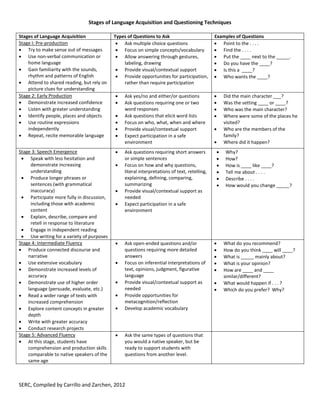
Helping Vs. Hovering: When Paraeducators work with Students HANDOUT
- 1. Stages of Language Acquisition and Questioning Techniques SERC, Compiled by Carrillo and Zarchen, 2012 Stages of Language Acquisition Types of Questions to Ask Examples of Questions Stage I: Pre-production • Try to make sense out of messages • Use non-verbal communication or home language • Gain familiarity with the sounds, rhythm and patterns of English • Attend to shared reading, but rely on picture clues for understanding • Ask multiple choice questions • Focus on simple concepts/vocabulary • Allow answering through gestures, labeling, drawing • Provide visual/contextual support • Provide opportunities for participation, rather than require participation • Point to the . . . . • Find the . . . . • Put the ____ next to the _____. • Do you have the ____? • Is this a ____? • Who wants the ____? Stage 2: Early Production • Demonstrate increased confidence • Listen with greater understanding • Identify people, places and objects • Use routine expressions independently • Repeat, recite memorable language • Ask yes/no and either/or questions • Ask questions requiring one or two word responses • Ask questions that elicit word lists • Focus on who, what, when and where • Provide visual/contextual support • Expect participation in a safe environment • Did the main character ___? • Was the setting ____ or ____? • Who was the main character? • Where were some of the places he visited? • Who are the members of the family? • Where did it happen? Stage 3: Speech Emergence • Speak with less hesitation and demonstrate increasing understanding • Produce longer phrases or sentences (with grammatical inaccuracy) • Participate more fully in discussion, including those with academic content • Explain, describe, compare and retell in response to literature • Engage in independent reading • Use writing for a variety of purposes • Ask questions requiring short answers or simple sentences • Focus on how and why questions, literal interpretations of text, retelling, explaining, defining, comparing, summarizing • Provide visual/contextual support as needed • Expect participation in a safe environment • Why? • How? • How is ____ like ____? • Tell me about . . . . • Describe . . . . • How would you change _____? Stage 4: Intermediate Fluency • Produce connected discourse and narrative • Use extensive vocabulary • Demonstrate increased levels of accuracy • Demonstrate use of higher order language (persuade, evaluate, etc.) • Read a wider range of texts with increased comprehension • Explore content concepts in greater depth • Write with greater accuracy • Conduct research projects • Ask open-ended questions and/or questions requiring more detailed answers • Focus on inferential interpretations of text, opinions, judgment, figurative language • Provide visual/contextual support as needed • Provide opportunities for metacognition/reflection • Develop academic vocabulary • What do you recommend? • How do you think ____ will ____? • What is _____ mainly about? • What is your opinion? • How are ____ and ____ similar/different? • What would happen if . . . ? • Which do you prefer? Why? Stage 5: Advanced Fluency • At this stage, students have comprehension and production skills comparable to native speakers of the same age • Ask the same types of questions that you would a native speaker, but be ready to support students with questions from another level.
